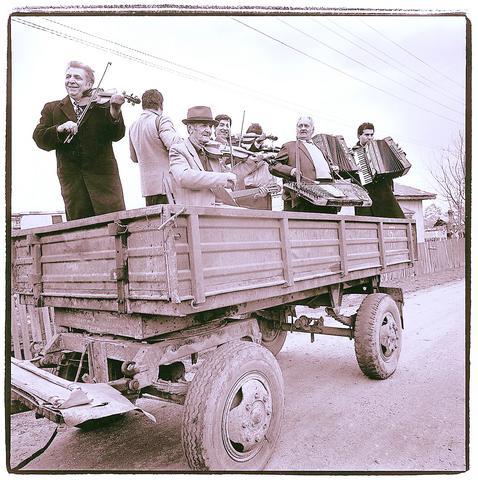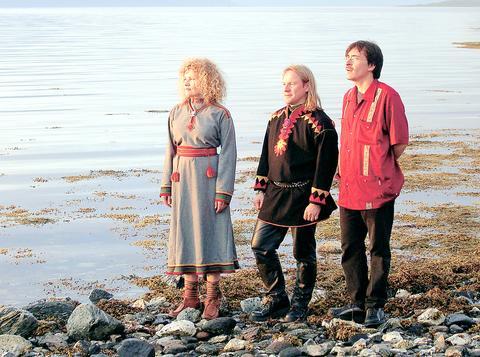The union of music and activism continues this weekend in Taipei with the third Migration Music Festival (
This year's theme, said Shih Fong Jihong (

PHOTO COURTESY OF TREES MUSIC MIGRATION MUSIC FESTIVAL
"Festivals can be used for people to celebrate different ethnic identities in the world and they can also address the mistreatment of minorities in society," said Jihong. "There are so many different cultures in the world and this is a good way to engage people from various backgrounds."

Inspired by the collective effort of Riddu Riddu, a large indigenous-music festival held in the small Norwegian village of Gaivuona, Jihong invited the event's founder, Henrik Olsen to speak at this year's Migration festival.
Rather than attend on his own, Olsen decided it would be more beneficial to bring a few Riddu musicians and organizers to share experiences with likeminded individuals in Taiwan. In the end, he could not raise enough money and had to downsize his delegation from five to three.

Olsen selflessly passed on his role as guest speaker to fellow Riddu organizer and Vajas member, Ande Somby. Although disappointed that Olsen will not be able to attend the show, Jihong is touched by his gesture.
"It is this kind of attitude that prompts people to get involved and volunteer in grassroots activities," she said. And it is the same attitude that prompted Jihong to launch the first Migration Music Festival in 2001.
"Our aim is not just a party with music but to involve people to encourage more educational activities."
The result is a weekend filled with options, including a documentary film festival and several workshops by program participants. One of the highlights promises to be a discussion led by Taiwanese documentary filmmaker Mayaw Biho, whose films deal with the ostracism of the Pangcah Aboriginal tribe.
The Sami, an indigenous people of northwestern Europe, are also a major focus of this year's show. Anita Lervolle, a Sami filmmaker, has captured the history and traditions of her people in a documentary film titled Greater Than Ourselves, which will be screened on Sunday. Ande Somby, co-founder of Riddu and a practising civil rights lawyer specializing in Sami law, will speak on how festivals can be used to raise issues of indigenous people's rights, in addition to the challenges of organizing such large events.
The major challenge of staging a Migration Music Festival, Jihong said, is the same as that of any non-commercial festival: funding. As a free event, the festival is run entirely on public donations, government sponsorship and volunteers.
The show will open with Taraf de Haidouks, a renowned Gypsy band from Romania. Ranging in age from 20 to 70 years of age, the 12 musicians have gained recognition across Europe where they've sold out venues in London and much of northern Europe. They've even become the talk of Hollywood, where according to online reviews, they have been flown out at the expense of Johnny Depp to play private parties in the US.
Sami vocalist Ande Somby will be heard with the accompaniment of fellow musicians who make up Vajas. Combing classical violin, melodic vocals and synthesized effects, Vajas is equipped to take listeners on a new age Arctic journey.
The Warsaw Village Band will perform a repertoire of Polish folk-dance melodies. Made up of six musicians playing string and percussion instruments, the group's formation stems from a desire to explore the folklore and sounds of their ancestors while maintaining a contemporary style.
What originated as a side project aimed at lifting the spirits of residents after the 1995 earthquake in Kobe, Japan, has lead to a fulltime gig for activist rockers, Soul Flower Mononoke Summit. Also know by its punk band alias, Soul Flower Union, the Japanese band performs acoustic material and rocked up versions of traditional Japanese folk songs.
From not so far away, Taiwan musicians Sheng Xiang and Water 3 (
Date with music:
FRIDAY: Official Festival Opening, at 7:30 with Taraf de Haidouks in Da'an Park
Saturday documentry:
2 pm: Storm Over Asia: The Heir of Genghis Khan
3:30 pm: Hakka Eight Tones
4:30 pm: Nul N'est Prophete en Son Pays
WORKSHOP:
2:30 pm: Warsaw Village Band
4:30 pm: Sheng Xiang & Water 3
GRAND STAGE:
7 pm: Vajas
8:30 pm: Warsaw Village Band
Sunday documentry:
1:30 pm: Celebrating Mum
3 pm: Greater Than Ourselves WORKSHOP:
2:30 pm: Soul Flower Mononoke Summit
5pm: Ande Somby (Vajas) GRAND STAGE:
7 pm: Sheng Xiang & Water 3
8:30 pm: Warsaw Village Band Grand stage musical performances take place at Taan Park (

June 2 to June 8 Taiwan’s woodcutters believe that if they see even one speck of red in their cooked rice, no matter how small, an accident is going to happen. Peng Chin-tian (彭錦田) swears that this has proven to be true at every stop during his decades-long career in the logging industry. Along with mining, timber harvesting was once considered the most dangerous profession in Taiwan. Not only were mishaps common during all stages of processing, it was difficult to transport the injured to get medical treatment. Many died during the arduous journey. Peng recounts some of his accidents in

“Why does Taiwan identity decline?”a group of researchers lead by University of Nevada political scientist Austin Wang (王宏恩) asked in a recent paper. After all, it is not difficult to explain the rise in Taiwanese identity after the early 1990s. But no model predicted its decline during the 2016-2018 period, they say. After testing various alternative explanations, Wang et al argue that the fall-off in Taiwanese identity during that period is related to voter hedging based on the performance of the Democratic Progressive Party (DPP). Since the DPP is perceived as the guardian of Taiwan identity, when it performs well,

The Taiwan People’s Party (TPP) on May 18 held a rally in Taichung to mark the anniversary of President William Lai’s (賴清德) inauguration on May 20. The title of the rally could be loosely translated to “May 18 recall fraudulent goods” (518退貨ㄌㄨㄚˋ!). Unlike in English, where the terms are the same, “recall” (退貨) in this context refers to product recalls due to damaged, defective or fraudulent merchandise, not the political recalls (罷免) currently dominating the headlines. I attended the rally to determine if the impression was correct that the TPP under party Chairman Huang Kuo-Chang (黃國昌) had little of a

A short walk beneath the dense Amazon canopy, the forest abruptly opens up. Fallen logs are rotting, the trees grow sparser and the temperature rises in places sunlight hits the ground. This is what 24 years of severe drought looks like in the world’s largest rainforest. But this patch of degraded forest, about the size of a soccer field, is a scientific experiment. Launched in 2000 by Brazilian and British scientists, Esecaflor — short for “Forest Drought Study Project” in Portuguese — set out to simulate a future in which the changing climate could deplete the Amazon of rainfall. It is